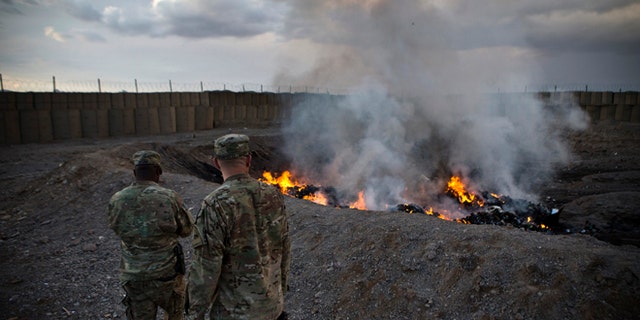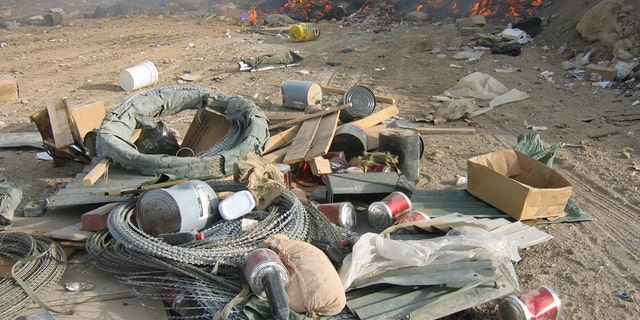VA cutting hurdles to vets' claims over toxic burn pit exposure in Iraq, Afghanistan

Stewart on ‘heartbreaking’ health effects for veterans exposed to ‘burn pits’
Activist and comedian says we can’t leave servicemembers hanging ‘this is the cost of war’ on ‘The Story’
Veterans who claim they were made sick from the toxic smoke emanating from burn pits on their military bases during the wars in Iraq and Afghanistan won a small victory after the Department of Veterans Affairs announced it they will begin taking claims on presumptive conditions due to their service.
Effective on Monday, the VA has begun processing disability claims for respiratory conditions like asthma, rhinitis and sinusitis on a presumptive basis. The processing of claims is based on presumed exposure to particulate matter during military service in the Southwest Asia theater of operations, which includes Iraq and Afghanistan. the initiative comes after being announced this past May.
“Through this process, I determined that the evidence provided was sufficient to establish presumptions of service connection for these three respiratory conditions,” Veterans Affairs Secretary Denis McDonough said in a released statement. “This is the right decision, and VA will continue to use a holistic approach in determining toxic exposure presumptives moving forward.”
U.S. Army soldiers watch garbage burn in a burn-pit on Feb. 4, 2013 at Forward Operating Base Azzizulah in the Kandahar Province of Afghanistan.
It was also announced by the department that will be conducting an outreach initiative to inform impacted veterans of their eligibility.
The Investigative Unit at Fox News has reported extensively on the fears that veterans have been made sick by exposure to fumes from burn pits. Many soldiers said the pits were a crude method of incineration in which every piece of waste was burned, including plastics, batteries, appliances, medicine, dead animals and even human waste.
“Any help is welcome, overdue and not sufficient.”
The items often were set ablaze with jet fuel as the accelerant. The pits burned more than 1,000 different chemical compounds day and night. Most service members breathed in toxic fumes with no protection. According to a registry created by the VA, over 200,000 vets said the exposure made them ill, but the department denied assistance to many of them.
Many veterans and their families have said that their experience trying to obtain assistance with health care coverage left them feeling as if they were being treated as if they were attempting to run a scam to obtain money from the federal government.
“They make you feel like, I don’t want to say that you’re doing something wrong, but almost like you’re doing something that’s suspicious or you’re being sneaky or you’re trying to take advantage of something that’s not for you,” Gina Cancelino, whose husband Joseph served in Iraq in 2003 as a gunnery sergeant for the Marines, told Fox News back in April. He passed away in 2019 after being diagnosed with cancer only two years earlier. “My children lost their father. He’ll never get to do anything with them. He’ll never see them do anything. They’ll never have him around again. And he was the provider for this family. You’re going to tell me I’m not entitled to something. You’re going to make me feel as if I’m trying to get over on you.”
Burn pits, like this one at FOB Marez, were originally considered a temporary measure to get rid of huge amounts of waste generated at bases. The array of material sent to the pits is said to have included plastics, batteries, metals, appliances, medicine, dead animals and even human waste.
(Courtesy of John Nelson)
Cancelino is part of veterans advocacy group Burn Pits 360 that has been lobbying recently to get presumptive condition status for service members with The Presumptive Benefits for War Fighters Exposed to Burn Pits and Other Toxins Act – a bipartisan bill sponsored by Sens. Kirsten Gillibrand, D-N.Y., and Marco Rubio, R-Fla., along with Rep. Raul Ruiz, D-Calif., that would require the VA to provide health and disability services to Global War on Terror (GWOT) veterans who served in places like Iraq, Afghanistan and other locations where they were exposed to toxins.
The Presumptive Benefits bill was introduced in September of last year but was reintroduced last March with updated criteria for presumptive care. The bill previously required that servicemembers had to prove a minimum of 15 days of their service.
To simplify eligibility, the updated bill now favors veterans having relevant service medals received after their tour of duty instead of documentation that they served a minimum number of days.
Comedian and advocate Jon Stewart, who has spent much of the past two years assisting advocacy groups like Burn Pits 360 and Wounded Warrior project lobby for The Presumptive Benefits Bill, said that this initiative is certainly a step in the right direction, it fails to help the scores of vets who say they developed rare cancers as a result of their exposure during service.
“Any help is welcome, overdue and not sufficient,” Stewart told Fox News.
Former VA Secretary David Shulkin, who has also been lobbying on Capitol Hill, said the new initiative has been a long time coming, but that more must be done.
“For too long we have let veterans wait while we study issues with research studies that take years to complete,” Shulkin told Fox News. “Today [the] VA signaled its willingness to start helping veterans who have been waiting, even while additional data may be pending. This is an important change in policy. However, there are many other veterans who were exposed to environmental toxins that are in need of help and are suffering and we need to broaden these policy changes so that veterans no longer have to wait while research is being conducted.
“I hope this will just be the first step in getting our benefits policies right for our veterans.”
Source: Read Full Article




